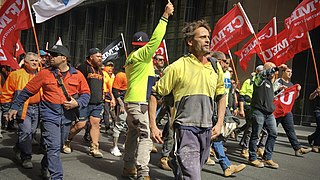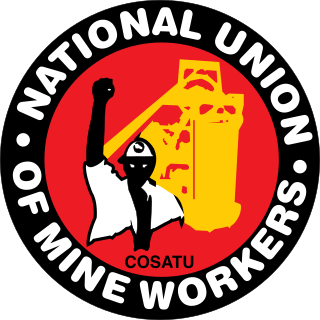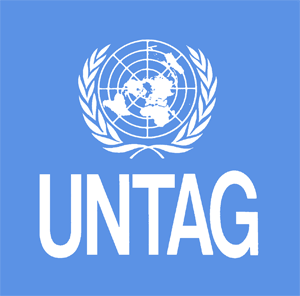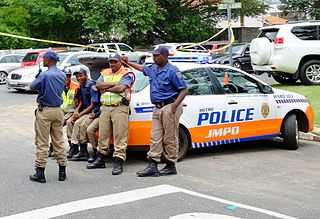
Strike action, also called labor strike, labour strike in British English, or simply strike, is a work stoppage caused by the mass refusal of employees to work. A strike usually takes place in response to employee grievances. Strikes became common during the Industrial Revolution, when mass labor became important in factories and mines. As striking became a more common practice, governments were often pushed to act. When government intervention occurred, it was rarely neutral or amicable. Early strikes were often deemed unlawful conspiracies or anti-competitive cartel action and many were subject to massive legal repression by state police, federal military power, and federal courts. Many Western nations legalized striking under certain conditions in the late 19th and early 20th centuries.

South Wales Police is one of the four territorial police forces in Wales. It is headquartered in Bridgend.

The 1918–19 British police strikes in the United Kingdom resulted in the British government putting before Parliament its proposals for a Police Act, which established the Police Federation of England and Wales as the representative body for the police. The Act barred police from belonging to a trade union or affiliating with any other trade union body. This Act, drafted and passed into law, was passed in response to the formation of the National Union of Police and Prison Officers (NUPPO). A successful police strike in 1918 and another strike in June 1919 led to the suppression of the union by the government. On 1 August 1919, the Police Act 1919 passed into law. Only token opposition from a minority of Labour Members of Parliament was voiced in Parliament.

The South African Police (SAP) was the national police force and law enforcement agency in South Africa from 1913 to 1994; it was the de facto police force in the territory of South West Africa (Namibia) from 1939 to 1981. After South Africa's transition to majority rule in 1994, the SAP was reorganised into the South African Police Service (SAPS).
The POA: The Professional Trades Union for Prison, Correctional and Secure Psychiatric Workers, also known as the Prison Officers' Association (POA), is a trade union in the United Kingdom. It currently has a membership over 30,000.

On 13 September 1989, 30 000 Capetonians from a diverse cross-section of the city marched in support of peace and the end of apartheid. The event, led by Mayor Gordon Oliver, Archbishop Tutu, Rev Frank Chikane, Moulana Farid Esack, Allan Boesak, and other religious leaders, was held in defiance of the State of Emergency. The march resulted in concessions from the apartheid cabinet headed by FW de Klerk, following years of violent clashes between anti-apartheid protestors and the police, and was the first such event to include elected world government functionaries. It was considered the "last illegal march" at the time, and went ahead without a major confrontation. The size of the protest, despite the open defiance, and the restrained response from the police signalled the beginning of the transition to democracy.

The National Union of Mineworkers (NUM) is a mainly mining industry related trade union, an organisation of workers with common goals through organised labour, in South Africa. With a membership of 300,000 as of 2014, it is the largest affiliate of the Congress of South African Trade Unions (COSATU).

The United Nations Transition Assistance Group (UNTAG) was a United Nations (UN) peacekeeping force deployed from April 1989 to March 1990 in Namibia, known at the time as South West Africa, to monitor the peace process and elections there. Namibia had been occupied by South Africa since 1915, first under a League of Nations mandate and later illegally. Since 1966, South African forces had been combating an insurgency by the People's Liberation Army of Namibia (PLAN), the military wing of the Namibian-nationalist South West African People's Organization (SWAPO). The UN Security Council passed Resolution 435 in 1978, which set out a plan for elections administered by South Africa but under UN supervision and control after a ceasefire. However, only in 1988 were the two parties able to agree to a ceasefire. As UNTAG began to deploy peacekeepers, military observers, police, and political workers, hostilities were briefly renewed on the day the transition process was supposed to begin. After a new round of negotiations, a second date was set and the elections process began in earnest. Elections for the constitutional assembly took place in November 1989. They were peaceful and declared free and fair; SWAPO won a majority of the seats. The new constitution was adopted four months later and it was followed by Namibia's official independence and the successful conclusion of UNTAG.

Law enforcement in South Africa is primarily the responsibility of the South African Police Service (SAPS), South Africa's national police force. SAPS is responsible for investigating crime and security throughout the country. The "national police force is crucial for the safety of South Africa's citizens" and was established in accordance with the provisions of Section 205 of the Constitution of South Africa.

Internal resistance to apartheid in South Africa originated from several independent sectors of South African society and took forms ranging from social movements and passive resistance to guerrilla warfare. Mass action against the ruling National Party (NP) government, coupled with South Africa's growing international isolation and economic sanctions, were instrumental in leading to negotiations to end apartheid, which began formally in 1990 and ended with South Africa's first multiracial elections under a universal franchise in 1994.

Human rights in Austria are generally respected by the government; however, there were problems in some areas. There were some reports of police abuse and use of unjustified force against prisoners. Antisemitic incidents, including physical attacks, name-calling, property damage, and threatening letters, telephone calls, and Internet postings occurred during the year. There was some governmental and societal discrimination against fathers, Muslims and members of unrecognized religious groups, particularly those considered "sects". There were incidents of neo-Nazi activity, rightwing extremism, and xenophobia. Trafficking in women and children for prostitution and labor also remained a problem.
The SouthAfrican Mine Workers' Strike was a labour dispute involving mine workers of Witwatersrand in South Africa. It started on 12 August 1946 and lasted approximately a week. The strike was attacked by police and over the week, at least 1,248 workers were wounded and at least 9 killed.
Venitia Govender is a South African social justice and human rights activist. She has been involved in the research, lobbying and advocacy, monitoring and challenging the promotion and protection of rights in the Southern African Region for over 20 years. In the 1980s she graduated from the University of Durban-Westville. In the early nineties, during the height of the violence during the transition in South Africa, she co-ordinated the independent violence monitoring organisation, Peace Action. She was the first coordinator of the Police and Prisons Civil Rights Union (POPCRU) and then a legal advisor to Gauteng's Secretariat of Safety and Security.
Moses Jongizizwe Mayekiso was a South African trade union leader and a leading activist in the struggles against the apartheid regime during the 1980s. He became general secretary of the National Union of Metalworkers of South Africa and an elected member of the South African Parliament.
The New Year Honours 1911 were appointments by King George V to various orders and honours to reward and highlight good works by members of the British Empire. They were announced on 3 January 1911.
The 1924 New Year Honours were appointments by King George V to various orders and honours to reward and highlight good works by members of the British Empire. They were published in The London Gazette on 1 January 1924.
The South African Railways and Harbours Union was formed by black workers of the South African Railways and Harbours Administration after they had been expelled from the National Union of Railway and Harbour Servants.
The South African Congress of Trade Unions (SACTU) was a national trade union federation in South Africa.
Oscar Mafakafaka Mpetha OMSS was born in Mount Fletcher 5 August 1909 and died on 15 November 1994. He was a South African trade unionist and political activist.
Gobonamang Prudence Marekwa is a South African politician, trade unionist and police officer who has served as a Member of the National Assembly of South Africa since November 2021, representing the African National Congress.










